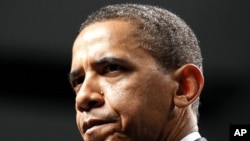President Obama is expected to outline his plans for beginning the withdrawal of US troops from Afghanistan on Wednesday. Britain also wants to withdraw its troops as soon as possible and the government will be listening closely to the US strategy. But there are concerns that an early pullout could reverse the gains made against the Taliban.
Britain has close to 10,000 troops deployed in Afghanistan and has spent billions of dollars on the mission since it started nearly a decade ago.
The government here will be listening closely to President Obama’s plans for a US withdrawal, says former soldier turned defense commentator Crispin Black.
“Certainly the prime minister, as far as it can be ascertained in public, wants to bring British troops back from Afghanistan as soon as he can - and not just in the usual way that they say they’re going to do that," Black said. "It looks like he’s serious and has warned military commanders that he intends to reduce the numbers as soon as he can.”
However, many of those commanders are warning publically and privately that a premature troop withdrawal by the U.S. and Britain would put the gains made in Afghanistan during the last decade at risk.
“By committing their countries to a withdrawal of combat capability by the end of 2014 there already is a risk being taken that the gains made would be reversed, and the only way to find out whether that’s the case is to try it," noted professor Malcolm Chalmers, from analyst group the Royal United Services Institute. "So I think the prudent thing to do is to start the process of reductions this year and in 2012 and see where we go as we go along - not least in terms of the Afghan military capability.”
The church bell tolls in the English town of Wootton Bassett as the body of another soldier killed in Afghanistan is flown back to the nearby airbase. In total 330 British servicemen and women have been killed in action since 2001. Opinion polls show the British public would welcome a troop withdrawal.
The British government says it is in the country’s interest to help create a stable Afghanistan.
Defense commentator Crispin Black believes Britain is fighting there because of its trans-Atlantic allegiance.
“In a sense one of the arguments for being in Afghanistan is we were executing an obligation to help our American allies," Black said. "That’s always seemed to me one of the stronger arguments for being there. But if the Americans are now deciding themselves, ‘Listen, this is not going to end in a victory, we’re going to talk to the Taliban, we’re going to reduce our troop numbers,’ even if it’s just reducing the surge they had recently, why therefore do we need to remain there to continue executing our obligation?"
Earlier this week a senior British navy official voiced his concerns that the military could not sustain its current commitments indefinitely. The British air force, the RAF, is playing a key role in the NATO operations against Colonel Gadhafi’s forces in Libya.
“The RAF of course is also deployed in Afghanistan so it’s a case of doing several things at once," said defense analyst Professor Malcolm Chalmers. "It’s also I think - there’s always a question, ‘What happens if something else turns up which is perhaps more important than Libya and you simply don’t have anything left in the locker?’”
At a time of military spending cuts, analysts say the start of a British withdrawal from Afghanistan would be welcomed in London’s political circles. But on the tough terrain of the Afghan battlefield, there is concern among the military that the Taliban could rapidly regain lost ground.
London Closely Watching Obama’s Afghanistan Moves




